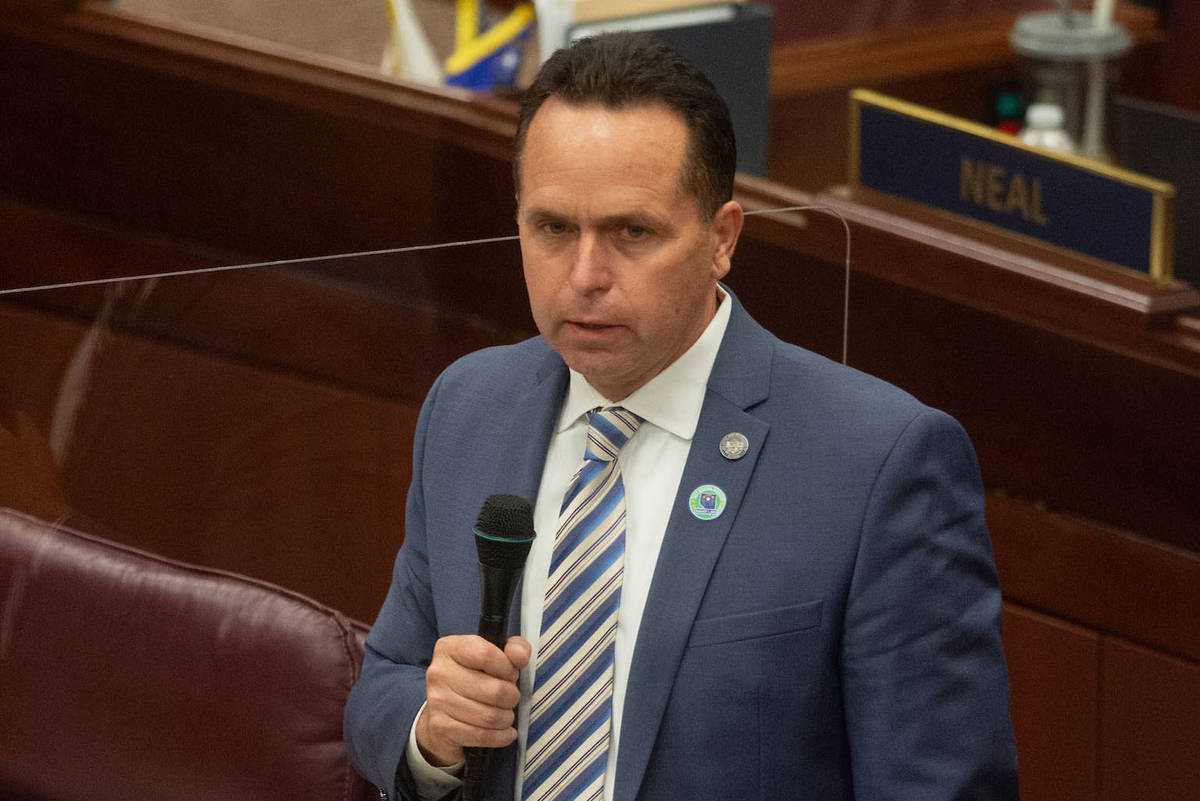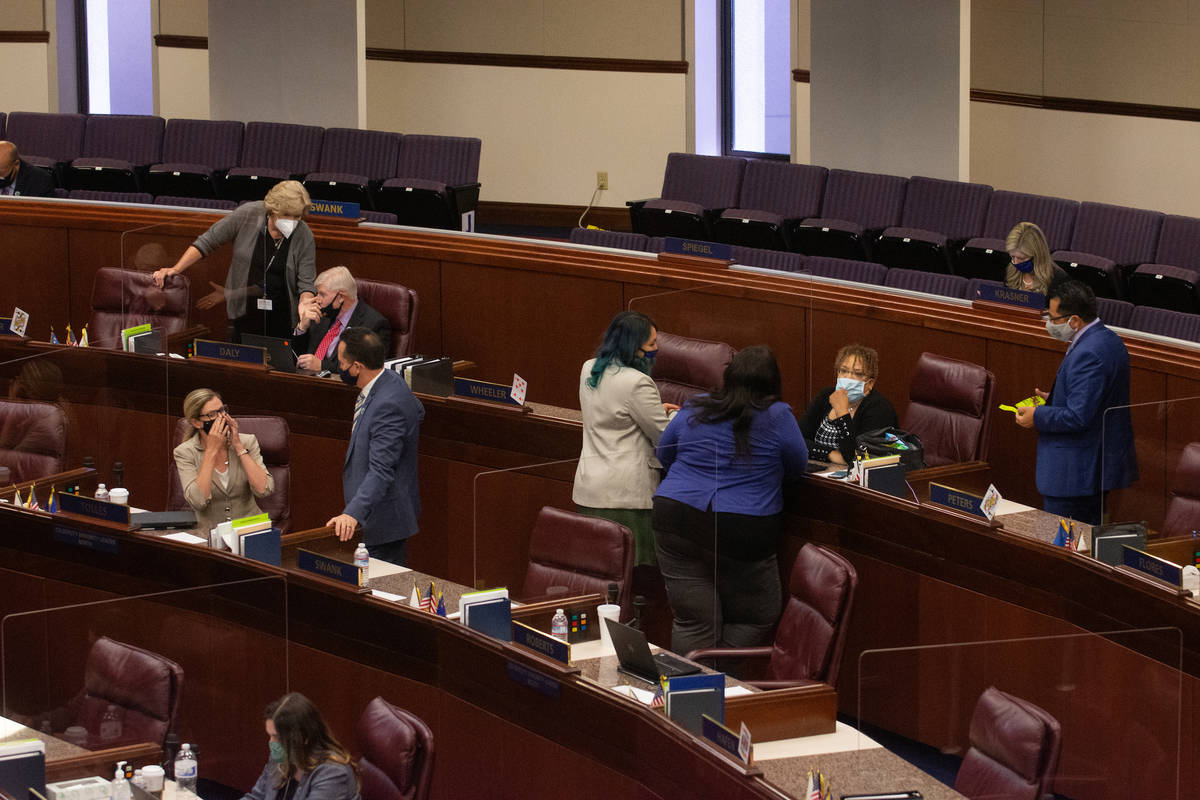Nevada lawmakers consider police reform bills in special session
CARSON CITY —Two police reform bills, one each in the Senate and Assembly, moved forward Saturday in spite of public reaction that ranged from only tepid support to blistering opposition, mostly from progressive interests who wanted lawmakers to do more.
Supporters lined up in favor of Assembly Bill 3, a ban on police chokeholds that passed the chamber and moved to the Senate, but many argued the bill barely scratches the surface on holding police accountable.
“This is the bare minimum of change that needs to occur in order to foster accountability,” Holly Welborn, policy director for the American Civil Liberties Union of Nevada, said Saturday while testifying in favor of AB3.
Senate Bill 2, which makes changes to a 2019 bill that strengthened rights for police officers facing non-criminal misconduct charges, was summarily denounced by opponents who sought the earlier bill’s outright appeal. The bill passed the Senate in committee and awaits a full vote in the upper house.
The Assembly bill also explicitly authorizes the filming of officers so long as it doesn’t interfere with police activity; requires officers to intervene if they see another officer using excessive force, and requires them to submit to drug and alcohol tests in the case of shootings. It also requires departments to send the legislature certain data relating to police stops.
The bill drew lukewarm support at best from police reform advocates, many of whom said the bill needed more teeth and should go further to address police accountability, especially in cases where officers use excessive force.
“The bill can be stronger because there doesn’t seem to be an accountability measure tied to the legislation,” said Nissa Tzun, co-founder of the Forced Trajectory Project, an advocacy group that documents stories of police violence, noting that the bill doesn’t not list specific penalties if officers don’t abide by the laws.
“If officers were to break this law, what would be the consequence?” Tzun asked.
The bill also garnered the support of the Las Vegas Metropolitan Police Department, the state’s largest police force.
AB3 mostly follows policies that are already on the books for the Metropolitan Police Department, noted Assemblyman Tom Roberts, R-Las Vegas, who retired from Metro as an assistant sheriff in 2018.
Roberts said that the bill is “not perfect,” but said that it would help improve community relations with police and help create best practices for police departments across the state.
Union opposed to bill
While the bill had the support of the department, the union representing the rank and file officers bridled at the bill, and said it was only brought “because of special interest groups.”
Scott Nicholas, vice president of the Las Vegas Police Protective Association, said that lawmakers shouldn’t be focused on of police reform amid nationwide marches protesting police brutality, and should instead turn their attention to “the dangers of resisting arrest.”
Nicholas said that he has “never watched a video of a complying person being handcuffed that died from a police encounter.”
“Compliance saves lives,” Nicholas added.
The bill passed the Assembly on a bipartisan 38-4 vote and later was voted out of committee in the Senate, but no final vote was taken in that house.
Senate bill draws objections
SB2, which passed out of committee on a party-line vote, proposes modest revisions to a bill passed in the 2019 session, Senate Bill 242, that strengthened certain rights and procedures for police officers under investigation for non-criminal misconduct.
What emerged in the revision bill, which became public Saturday just moments before its first hearing, pleased neither progressives, who want a complete repeal of the 2019 bill, nor police advocates, who back the original bill’s enhanced protections.
Opening the Senate’s committee hearing on the bill Saturday, Majority Leader Nicole Cannizzaro, D-Las Vegas, a prosecutor who also sponsored the 2019 bill, said the measure’s changes would made “timely and appropriate adjustments that reflect not only the needs of our hard working peace officers, but also for the public whom they protect.”
Specifically, it extends the look-back period for investigating misconduct to five years from just one, eliminates prohibitions on reopening an investigation or reassigning a police officer under investigation, and allows officers facing punitive action to inspect the evidence against them and respond to it. It would also permit statements made by the officer to be used in civil proceedings.
Sen. Melanie Scheible, D-Las Vegas, also a Clark County prosecutor, said the bill’s provisions apply “for violations of policy, so it’s kind of like an HR investigation as opposed to a criminal investigation,” and that they also mirror rights of those accused to inspect and challenge evidence against them.
“I do think that this bill is responsive to some — not all — but some of the criticism that we have received since passing it,” she said, adding that it “strikes a good middle ground.”
Opponents, mostly from progressive causes, blasted the bill for not repealing the 2019 bill outright, and also for being given no time to review it prior to the hearing.
“The community has been begging you to fix SB 242 with a complete repeal, and what this process tells community advocates is that the police are still the priority and that the community once again really doesn’t matter,” said Annette Magnus, executive director of Battle Born Progress. “You need to absolutely listen to black and brown people, and you need to fully repeal SB 242 as the community has asked you to do.”
Contact Capital Bureau Chief Colton Lochhead at clochhead@reviewjournal.com. Follow @ColtonLochhead on Twitter. Contact Capital Bureau reporter Bill Dentzer at bdentzer@reviewjournal.com. Follow @DentzerNews on Twitter.



















